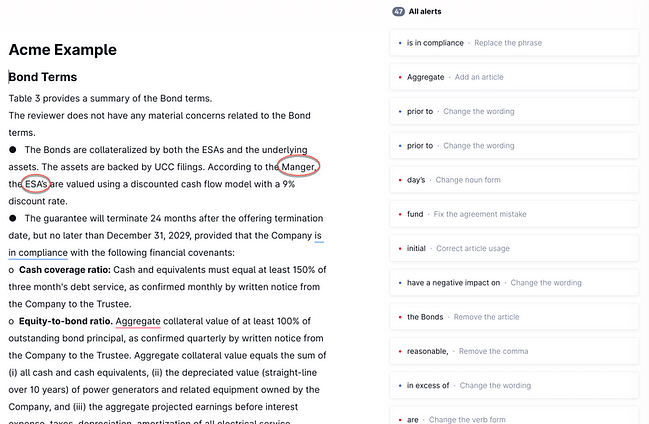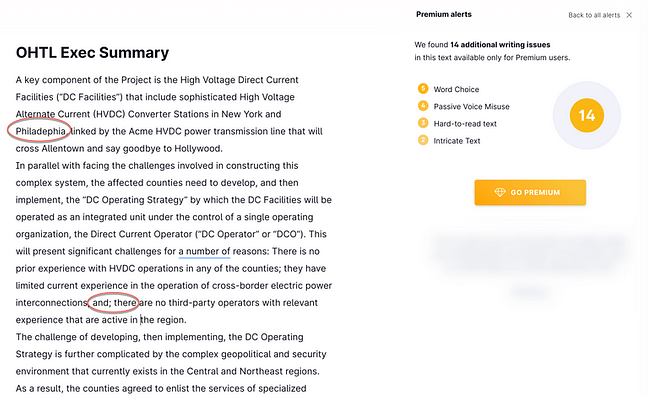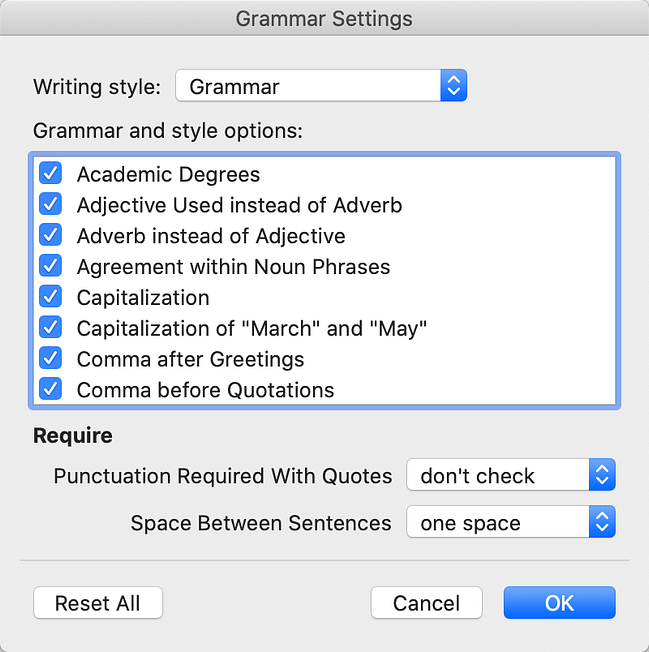If you’re like any other human with a computer, you’ve seen the ads for Grammarly, the grammar-checking software. I began to wonder. Could these kinds of software make me better and faster at editing, taking care of the nitpicky parts of the work and leaving me free to ponder the weightier issues in the text?
As a technical writer, though, I had my doubts. It's one thing to be able to edit a high school book report or a casual email; it's another thing entirely to parse and reconstruct the word tangles and consistency issues that appear in most technical reports. Technical writing is often like cooked spaghetti. It's either so loose and slippery it runs right through your fingers, or it's so sticky that it welds itself together into a hard, unpalatable mass.
With these questions in mind, I decided to put Grammarly to the test. And because most technical content is written in Microsoft Word, I thought I should evaluate Word’s grammar feature as well. I wanted to see for myself what value these two go-to products might offer to those who write about scientific and technical subjects.
One thing I was sure of was that I wanted a realistic assessment of these tools in the trenches. To achieve this, I took sections from actual technical reports, removed all identifying features, and ran them through the two editing products in order to create apples-to-apples comparisons.
Let's dig into it.
Notes on software and settings: This review is based on Grammarly’s basic service, not the premium subscription. For this experiment, I adjusted Grammarly’s "goals" settings to account for a business-formal document to be read by people knowledgeable in the industry. For Word, I have a subscription to Microsoft 365 for Mac. I used the default "English (US)” language settings to evaluate the first text sample and the "English (UK)" option for the second. I then activated most of the grammar and style options Word offers (though not all, such as flagging slang or contractions).
Results

Grammarly’s review of this financial report found many issues, but also missed two egregious errors, circled in red above.
In a 9-page, 2770-word sample report on investment structures (partially shown above), Word found only 6 grammar problems total. Grammarly flagged 47 “problems,” which is at least more realistic. But when I went through each of its recommendations, I discovered that Grammarly commonly flagged text that either wasn’t actually a problem or made a bad or confusing suggestion. Of the alerts it compiled, 18 recommendations were either incorrect or inadvisable—a full 39%. And that count doesn’t include the issues that it missed entirely (such as “Manger” for “Manager”).

In its review of the same text snippet (above), Word finds only one error and makes a bad recommendation to change "in compliance with the following" to "follows the following” (rather than the more obvious "complies with the following”).
In the interest of time, I won't go through every alert in this 9-page report snippet. Instead, I've compiled a few examples in the table below that are representative of the recommendations from both pieces of software. The first column shows the original text from the client, then Word and Grammarly's recommendations, and then the final corrected versions. Sadly, Word found only one error in these samples (the serial comma missing after building in the third example). Grammarly found issues with all four examples but then made poor or flat-out-wrong recommendations.
Original Text | MS Word's Edits | Grammarly's Edits | My Edits |
|---|---|---|---|
the would be paid out of net proceeds | No changes | the would-be paid out of net proceeds | they would be paid out of net proceeds |
60 day’s prior written notice | No changes | 60 days prior written notice | 60 days’ prior written notice |
Notes payable consisted primary of a on land, building and assets | Notes payable consisted primary of a on land, building, and assets | Notes payable consisted primarily of an on land, building, and assets | Notes payable consisted primarily of land, buildings, and other assets |
The reviewer recommends that the firm obtain current background searched from a reliable source. | No changes | The reviewer recommends that the firm obtain the current background searched from a reliable source. | The reviewer recommends that the firm obtain current background searches from a reliable source. |
Overall, the software results are pretty underwhelming. Some of these errors seem trivial to the human eye, yet clearly the software faltered badly.
Now we’ve seen how Word and Grammarly respond to a financial-type report. Perhaps financial reports are unusually difficult for the software to parse. What about another type of technical document?
My other sample is an executive summary proposing a new high-voltage electricity transmission line. The text is very formal and full of acronyms and industry terms, so pretty standard for anything involving engineering and/or major infrastructure. I ran the sample through both Grammarly and Word, again adjusting the settings for highly formal text and, in this case, for a British audience to match the origin of this document. Let’s look at what Grammarly had to say about this extremely formal writing sample:
(Again, all identifying information has been altered or removed. Extra points if you can spot where some of it was.)

Grammarly’s basic service had only one recommendation for this sample and missed two egregious errors (again, circled in red).
I agree with Grammarly that there’s both not a lot egregiously wrong with this executive summary and that it requires focus to read. I don’t consider this to be a flaw, though. This level of formality is expected from a large-scale engineering project, and the language used shows the kind of high-level thinking a project of this scale requires.
However, in the sample shown above, the basic service only recommends changing the phrase “a number of” to “several.” This is clearly not a meaningful edit, and the software doesn’t catch the punctuation errors in the last sentence of the paragraph at all.
Word, bless its little algorithms, had no grammar recommendations for this text at all. But (and I find this illuminating), Word at least noted the misspelling of Philadelphia in the fourth line. Grammarly totally missed this. If I had been relying on Grammarly to avoid looking foolish, I would have been let down big time.
Beyond the Basics
So we've looked at how capable Grammarly and Word are at reviewing fairly standard technical documentation. But how do these two tools compete on other criteria? Let’s look at some of the broader issues that apply to technical writing.
Dialects/Versions of English
Both Grammarly and Word provide support for American, British, Canadian, and Australian English in spelling and grammar. For general writing such as emails, Slack messages, and memos, Grammarly does a reasonable job in these four dialects. I can't speak to its usefulness in other dialects.
Word provides similar spelling support for these same varieties of English. Unfortunately, Word's grammatical advice doesn’t improve by selecting a different variant of the language.

Despite a long list of grammar and style options available (partially shown above), Word is insensitive to many grammatical errors.
Custom Spelling
One of my favorite features of Word is its ability to upload a custom dictionary. The ability to apply a list of scientific/medical terms to your text files can transform a multiple-hour, eye-straining, mind-numbing chore of hunting down spelling mistakes into half an hour of easy clicking while listening to your favorite beach playlist. Imagine reviewing 50 MSDS files on pharmaceuticals, for example, or an entire book on phytopathology, and you’ll understand my love of Word’s custom dictionary feature. Grammarly fails here utterly in that it requires you to load one word at a time into its spellchecking function. This is highly impractical for technical fields with large subject-specific vocabularies.
Use of Passive Voice
On the matter of noting passive voice, both Word and Grammarly are pretty good. And both generally make appropriate recommendations about how to revise to active language. However, the more complicated your sentence, the less likely it is that the recommendation will be correct. This is definitely a case of caveat emptor (buyer beware). Also, just because something is passive does not make it wrong. Sometimes passive is the most natural, most direct, most accurate way to express an idea. Just use it judiciously.
Nuance & Tautology
One of the most common problems both tools have is in understanding nuance, which can be critical in technical materials. For example, both types of software generally flag tautology (aka “repetition using different words”) as an error of “wordiness” rather than recognizing it as a writing device. A client of mine pointed this issue out, offering this example: "Jim is also investing for his own account." Grammarly wants to delete "own" from this sentence, yet it's critical in distinguishing between something that belongs to Jim personally and something Jim works with in a professional capacity.
Errors in Logic or Omission
The most obvious flaw, perhaps, of any editing software is its inability to recognize errors of omission or faulty reasoning, which a good human editor will pick up immediately. Grammarly and Word will never point out that the argument on page 15 conflicts with the reasoning on page 7, or that you promised an image of dogs snuggling with cats but actually used an image of gerbils racing giraffes. The software just isn't designed for that. But those kinds of errors are very often the ones that are the most painful or embarrassing.
Security
Cloud-based software is great for sharing documents with teams and patching bugs: it also creates great opportunities for hackers to break into your files like a pickpocket hovering around a stadium event. Word does better on security issues because you can keep documents on your machine rather than having to upload them to the cloud for the tool to work. To its credit, Grammarly provides a good discussion of its security practices on its site. However, using a cloud version of any software will always create vulnerabilities. Grammarly offers a desktop version for Mac users to help avoid this issue, but PC users are currently out of luck.
Side note: My husband works for a software security firm. I asked him how his employer would view the use of cloud-based software to edit any of his work documents, even a thank-you note. His response was, "That’s a fireable offense."
Final Grades
Criteria | MS Word | Grammarly |
|---|---|---|
Grammatical accuracy | D | C |
Spelling | A | B– |
Platform flexibility | B–: Office-suite programs only | B+: Anything you can cut and paste onto its site, plus a lot of online apps such as Slack, Gmail, and Outlook. Desktop version for MS Word (Mac only) |
Security | A | C |
Variations of English | C | B |
Cost | Free with Microsoft Office subscription | Basic service is free/Premium starts at $140/yr USD |
Time Savings | B: High confidence of catching spelling errors and double words. But because Word misses so many grammatical issues, you won't waste a lot of time reviewing the mistakes it doesn't catch. | B-: You can spend quite a bit of time reviewing all of Grammarly's recommendations and evaluating whether they're reasonable. For most writers, it'll be faster (and more accurate) to just look over what it flags without bothering with the recommendation and decide for yourself if you want to make a change. Not as reliable a spellchecker as Word. |
Overall grade and recommendation | C: Best for security and spellchecking. | C+ for promises unkept: Grammarly’s basic service missed many basic errors, and almost 40% of its recommendations were unhelpful at best. However, I’m told the premium service is a step up and does catch misused words, like "Manger/Manager." It can be helpful in training yourself to notice common writing issues, like overuse of passive voice. |
So are either of these products worthwhile, especially for technical writing? Yes, as long as you understand their purpose and don’t expect much from them.
If you want to improve your awareness of basic grammatical structures, Grammarly is a reasonable way to start. It at least picks up on legitimate issues for you to consider. But since the basic service doesn't show you everything that the software found, you have to get the premium version to get any real value.
That said, seeing the types of issues Grammarly flags will likely help you recognize common grammatical problems, which can lead to stronger writing. It’s also helpful as a quick check for egregious errors in your emails or Slack messages. (Remember, Microsoft 365 can only review text inside Office-suite programs; Grammarly is available on more platforms.) However, non-native speakers should be wary of relying on either Grammarly’s or Word's recommendations; it would be very easy to just substitute one error for another.
For its part, Microsoft Word does a truly poor job of catching even egregious grammatical errors and should not be relied on for grammar help. However, it has its own special usefulness as a masterful spellchecker.
Overall, if what you’re looking for is a double-check against egregious errors, Grammarly and Word are not bad at all. Both are good at helping you sweep through a document rooting out blatant errors when your brain has moved on (particularly repeated words words, which the brain often doesn't pick up on).*
My recommendation is to use grammar-checking tools if you’re so inclined, but approach them with caution. They can be genuinely helpful as a first-pass check for embarrassing goofs. It was enlightening to use both products and see the different kinds of errors each found. But in the end, simple errors are all they're good for.
Unsurprisingly, neither of these tools is good at that most critical editorial skill—judgment. Language is possibly humanity's finest, most powerful, most delicate, and most complex invention. It is a tool that can represent who we are, how we think, and even what we aspire to. Editorial software doesn't come close to that level of sentience. Nothing is better at evaluating the quality of your written communication than a well-reasoned, well-rested human brain—not yet.
*Yep, that sequence is intentional. It amuses me.
